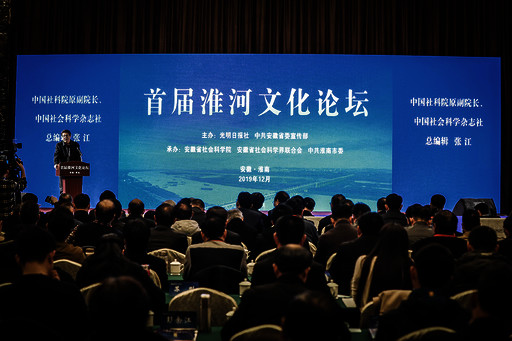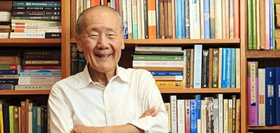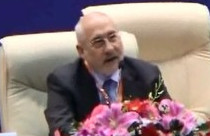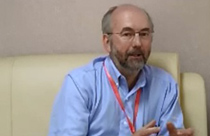Regional development calls for Huaihe culture’s soft power
Author : ZHANG WEI and WANG YUJIE Source : Chinese Social Sciences Today 2020-01-10

The 1st Huaihe Culture Forum in Huainan Photo: ZHANG ZHE/CSST
HUAINAN—The 1st Huaihe Culture Forum was held in Huainan, Anhui, to discuss the value of the Huaihe culture for today’s era.
The construction of the Huaihe River green economic belt has been formally elevated to one of China’s regional development strategies. This urges the improvement of the Huaihe culture’s soft power.
Yu Aihua, director of the Publicity Department at the CPC Anhui Provincial Committee, proposed that inheriting and developing the Huaihe Culture has great value for the construction of the economic belt, the construction of a beautiful Anhui under the Five Major Development Concepts of innovative, coordinated, green, open and inclusive development, and the great rejuvenation of the Chinese nation.
Zhang Jiang, editor-in-chief at Social Sciences in China Press, said that we should pay closer attention to and continuously promote deeper research on the Huaihe culture. We should also examine the laws and trends of this culture’s development and strive to modernize the fine traditional elements in this culture.
Lu Xian’gao, deputy editor-inchief of Guangming Daily, said that we need to enhance our understanding of the origins of Chinese civilization and the circumstances of exchange and development in early times to deepen our sense of identity and confidence with this 5,000-year-old civilization. More attention to the modernization of the Huaihe culture could promote coordinated regional economic and social development.
The research on the 24 solar terms and the Huainanzi, a Chinese classic written in the 2nd century BCE, was another major feature of this forum, as it filled in some blanks in the previous academic study of the Huaihe culture.
The Huainanzi gave a full record of the 24 solar terms for the first time in Chinese history and its description method was precisely calculated and deduced based on the wisdom of predecessors, said Wu Jing, deputy director of the Party History Research Center of the CPC Anhui Provincial Committee. The innovative value of this literature is undeniable, Wu added.
Wang Fuzhou, vice president of the Chinese National Academy of Arts, said that the 24 solar terms, knowledge in China of time and practices developed through observation of the sun’s annual motion, was added to the UNESCO world intangible cultural heritage list, demonstrating the richness and diversity of Chinese heritage to the world and setting an example for how to spread traditional culture.
The research on the construction of the Huaihe River green economic belt and the coordinated development of cities and provinces surrounding the Huaihe region was a hot topic at this forum.
Tang Zhouyan, party secretary at the Shandong Academy of Social Sciences, said that the State Council has approved an ecological and economic development plan along the Huaihe River, which reflects a shift in the concept behind the governance of the Huaihe River from traditional flood prevention and control to sustainable development. He suggested that the government should pay great attention to the three major projects to protect the cultural heritage of the Huaihe River: the project of enhancing the charm of historic cities, counties and villages surrounding the Huaihe River; the project of seeking value in the culture and tourism of the water conservancy heritage; and the project of Huaihe culture communication and exchange. There is a great need to fully understand and tap the economic and social value of the Huaihe culture in a bid to promote the construction of this economic belt and the revitalization of northern Anhui.
Song Yuqin, a professor from the College of Environmental Sciences and Engineering at Peking University, suggested that a SuiTang Canal Culture of Water Ecomuseum should be established based on the Grand Canal world heritage in northern Anhui to show and spread traditional Chinese water culture.
Interview with Wang Gungwu on significance of studying overseas Chinese
Wang Gungwu is a distinguished Australian historian who studies overseas Chinese. He currently works at the Faculty o...
-
On the rat/mouse of the zodiac
2020-02-20
-
Regional development calls for Huaihe culture’s soft power
2020-01-10
-
Archaeological discoveries unveil Maritime Silk Road
2020-01-06
-
China’s industrial art printing
2019-12-10
-
Yue-Gan Ancient Road: A journey into Hakka history
2019-05-13
-
The Lantern Festival in Dream of the Red Chamber
2019-02-18














 2011-2013 by www.cssn.cn. All Rights Reserved
2011-2013 by www.cssn.cn. All Rights Reserved